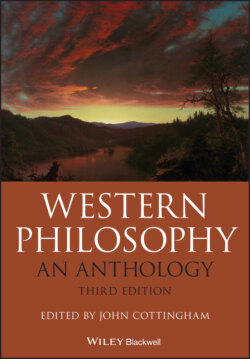Читать книгу Western Philosophy - Группа авторов - Страница 64
8 Experience and Understanding: Immanuel Kant, Critique of Pure Reason*
ОглавлениеThe history of the theory of knowledge is sometimes presented as a battle between two opposing camps of philosophers – empiricists (from the Greek, empeiria, ‘experience’), who believe sensory experience is the basis of all knowledge, and rationalists (from the Latin, ratio, ‘reason’), who believe the inner light of reason enables us to acquire knowledge that is independent of experience. The contrast can be overdone, and it easily leads to oversimplifications; but we can, nonetheless, discern empiricist elements in the above extracts from Aristotle and Locke, while the selections from Plato and Descartes reveal a distrust of the senses that is characteristic of the ‘rationalist’ outlook. Leibniz, as the above extract (no. 6) shows, stressed the importance of sensory stimulus for the mind, but nevertheless insisted on the innateness of a ‘host of objects of our intellectual ideas’. In his monumental work the Critique of Pure Reason, published in 1781, the celebrated German philosopher Immanuel Kant attempted to resolve some of these tensions.
Kant’s views on knowledge were strongly influenced by David Hume, whom he credited with having roused him from his ‘dogmatic slumbers’. Kant’s fundamental thesis is that the only possible objects of human knowledge are phenomena – the empirically observable objects of the world around us. ‘Nothing is really given us,’ he argued, ‘except perception and the empirical advance from this to other possible perceptions.’1 He is thus deeply suspicious of the claims of ‘rationalist’ philosophers of knowledge to describe a reality going wholly beyond the observable world. But he is equally critical of Locke’s thesis that knowledge arises from the ‘empty cabinet’ of the mind being furnished with sense impressions. As he puts it at the start of the extracts quoted below, ‘although all our knowledge begins with experience, it does not follow that it all arises out of experience’. According to Kant, the mind, in experiencing the world, necessarily interprets it or processes it in terms of a certain structure: it comes to the world already armed with ‘concepts of the understanding’. These concepts are described by Kant as a priori, meaning prior to, or independent of, experience. But Kant takes a crucially different route from previous innatists who had suggested that the mind was simply endowed (by God, as Descartes maintained, or from a previous existence, as Plato had it) with a range of nonempirical concepts and truths. Instead, Kant argues that all the concepts of the understanding are derived from certain fundamental categories which are presupposed by experience. Categories such as the categories of substance and causality are fundamental preconditions for our being able to experience the world at all. Kant thus offers a compromise between, or rather a synthesis of, empiricist and rationalist approaches to knowledge. Knowledge involves a kind of fusion of ‘intuitions’ (sensory representations) on the one hand, and the concepts of the understanding on the other. As he puts it below, in what has become a much-quoted slogan, ‘thoughts without content are empty, intuitions without concepts are blind’.
